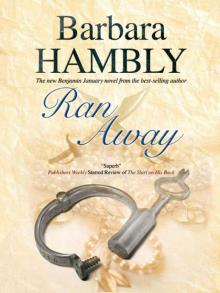- Home
- Hambly, Barbara
Nanya of the Butterflies (Sun Wolf and Starhawk)
Nanya of the Butterflies (Sun Wolf and Starhawk) Read online
NANYA OF THE BUTTERFLIES
by
Barbara Hambly
Copyright 2013 Barbara Hambly
Cover art by Eric Baldwin
This ebook is licensed for your personal enjoyment only, and may not be re-sold. If you would like to share this ebook with another person, please include this license and copyright page. If you did not download this ebook yourself, consider going to Amazon.com and doing so; authors love knowing when people are seeking out their material. Thank you for respecting the hard work of this author!
Table of Contents
Nanya of the Butterflies
About the Author
The Further Adventures
Nanya of the Butterflies
by
Barbara Hambly
The dragon came down on Ilfagen like death-storm and nightfall.
Bronze, green, and purple it flashed in the firelight; eyes like diamond jetting flame. Cattle and horses it caught up in claws like black scimitars; the burning vomit of its mouth scorched barns and houses, so that the screaming of women and children carried over the woodlands with the charred stink of smoke.
There’s something wrong…
Even in his dream, Sun Wolf felt it. Like the smell of smoke in the night, of blood in a dark room.
“Chief?”
Starhawk’s touch was enough to waken him and her voice enough to keep him from going for the sword that, even now – almost two years since he’d given up the life of a mercenary captain – he kept beside his bed.
It was dark in the hut that they shared, in the Lost Hills near the sources of the Tashbourne. The winds that combed screaming over these barren lands eight months of the year were still, and moonlight fell through the open windows and made a succession of white stepping-stones across the silk-smooth oak of the worn floor.
“What is it?”
“A dragon.” His first words on waking hurt, as they always did; the scarred mess left of his throat would stiffen up when he slept. “A dragon has come to Ilfagen.”
Automatically he pulled his eye-patch out from under the pillow, slipped it on in case the conversation progressed to the point of lighting a candle. The Hawk had seen him in far worse shape in her years as his second-in-command – and had certainly gotten used to the sight of the scarred and empty socket – but there was no need to be revolting.
“Yeah, that was last year.” She sat up, baby-silk hair a close-cut fluff of ivory in the moonlight. “King Sidthe gave his daughter’s hand in marriage to the warrior who slew it – and I always wondered what the poor girl thought of that arrangement? I mean, what if the guy turned out to be a total podex? He was a prince or something from the royal house of Ciselfarge…”
“No,” said the Wolf, knowing what he said was the truth. “This was tonight. This was now.”
“They got a second dragon?”
“I don’t know, but I think this one was summoned.”
*
Moggin Aerbaldus, the scholar with whom Sun Wolf and Starhawk shared the hillside hermitage, allowed, over breakfast the following morning, that he had read of mages summoning dragons, though it was uncommon. “For one thing, once summoned, they are impossible either to control or dismiss—”
“Oh, nice.” The Hawk poured out tea from the iron pot on the sheltered porch where they sat. The porch functioned as a summer kitchen: though houses in these wasted northlands had to be banked with pine-boughs every winter to keep in the warmth, once the tardy spring finally arrived everyone in the tiny village of Deepgore– the nearest settlement, half a day’s ride to the south – lived in these open rooms.
“For another,” the scholar went on, “all the books agree that it takes great power to summon even a young dragon. They are uncanny creatures, and their strength grows with age. There is magic in them – that’s why all the grimoires list their bones, teeth, scales and blood as ingredients in spells – and so they cannot be commanded, as mages can learn to command beasts and birds.”
Sun Wolf growled. The absence – in the score or so of books he had managed to assemble concerning the theory and practice of the magic which had been unlocked in his body and bones two years previously – of any spell concerning the command of birds and beasts was something of a sore point. After over a year of experimentation the household was still relying on Moggin’s cats to keep the mice away.
“So there’s a wizard of major strength in or near Ilfagen.”
“Who thinks it’s a good idea to summon a dragon,” Starhawk reminded him.
“On a town that was just attacked last year,” added Moggin thoughtfully. “Which leads me to wonder about that first visitation.”
Sun Wolf was silent. The magic he had felt in his dream had been unmistakable, strong and palpable as wind. Human magic. Of that, too, he was certain. He’d spent almost twenty-five years of his life killing people for pay, burning their houses, selling whoever he could catch into slavery, rape, and degradation. The sound of screaming from those burning cottages remained in his mind like shards of metal lodged in his flesh.
A dragon was one thing: perilous, deadly, the most terrible of the beasts of the earth.
But like a beast it was innocent.
Someone had called the thing, knowing what it would do.
And that someone had the education in magic that he himself lacked. That everyone in the world lacked. The Wizard King Altiokis had lived for close to a hundred and fifty years, and in that time had killed every mage, and burned every book of magic, that he could lay hands on. Since that dark lord’s death, Sun Wolf had encountered three or four others, mageborn like himself, but either as untrained as himself, or half-trained with whatever scraps of knowledge and skill had been passed along in secret.
Like plants grown in secret, it was a stunted knowledge, deformed and inconsistent.
Nothing that could summon a dragon.
Somewhere, someone had to have training that was complete and true.
He was aware that his two companions were watching him.
A mage who could summon a dragon would have a great deal to teach him.
A mage who would summon a dragon was not anybody he wanted to meet.
If such a person was at large in Ilfagen, the people of that small kingdom would need help.
“Well,” he said at last, “we can go have a look at the place, anyway.”
*
When they reached Kwest Mralwe to take ship for Ilfagen the talk in the waterfront taverns was of nothing but the dragon. “Shamash Hadru of the Banu Horad came through here three days ago,” a confidence trickster named Moonweasel informed them, over the very good ale available at the Labor in Vain. “Full of talk about how he’ll slay the thing this time, and slingin’ money about like he thought the good will of the beggars and whores would help him against it. I sold him a potion to fireproof his flesh for thirty silver—”
“And he bought it?” Starhawk shook her head in amazement.
“My dear girl—” Moonweasel spread his expressive hands. “Since the Wizard King’s fall, people will believe any sort of magic is possible. Bram Kathel, the King of Dalwirin’s nephew, took ship from here also, with four or five men-at-arms…. Queen Caia’s offered a thousand gold pieces for the dragon’s head, but it isn’t like last year, when her dad was offering Caia’s hand to the dragon-slayer. A man can pick up a thousand gold pieces signing on with a mercenary band, if they loot the right city.”
According to Moonweasel, the slayer of the previous dragon – Martus of Ciselfarge – had been a mercenary himself, among the Megantic Islands, though of course that rumor was denied now that King
Sidthe had died and the princess that Martus had wed as reward for slaying the dragon had ascended to the throne. “What’s in Ilfagen anyway, that two dragons would be drawn there?” asked Starhawk, signing for the potboy to re-fill their ale. “I mean, yes, the town makes a good living trading pottery and swordblades with the Islands, and last year there was a war in the Eastern Islands that could push a dragon to prey on some city of the Peninsula… But why would a second one come along? It’s not like they have a big treasure-horde or anything.”
“You think dragons hang out in taverns asking each other who’s having a good year?” retorted the confidence-man tartly. “They’re beasts, like wolves…”
They weren’t, but Sun Wolf – drinking quietly and watching the sea-captains and stevedores, brightly-dressed Daughters of Joy and their posturing tattooed boy-friends, come and go through the plastered colonnades of Water Street – didn’t press the matter. The question had nagged him, too, all the way down from the Silver Hills and across the badlands.
Now he asked, “You wouldn’t have heard any rumors about a wizard in the Petti-Gwarl—” He named the southern almost-island end of the Gwarl Peninsula, of which Ilfagen was the chief city, “—would you? Or of any particular trouble Ilfagen’s having with its neighbors?”
“Other than the usual, We want your vineyards and you won’t give them to us?” Moonweasel shook his head. “The priest-kings of Preth Vanu are always trouble, and the head of the merchant council of Oshar thinks his son should have married Princess Caia instead of some jumped-up mercenary who happened to slay a dragon. But Darvi – Queen Caia’s uncle – keeps the whole region pretty firmly in hand. He has no official power, but if you ask me, I think it’s Lord Darvi who runs things in Ilfagen.”
“And what,” inquired Starhawk, “does our brave dragonslayer think about that?”
“Who knows? He’s done his job. As for wizards, there’s only—Ah!”
He turned on the bench as a young man entered the tavern, looking about him short-sightedly while a stout man in a scholar’s long gown sidled nervously at his elbow. Sun Wolf marked them down as the schoolboy scion of some merchant house and his tutor, even as Moonweasel sprang to his feet and advanced upon the scholar: “Empilius, my dear old friend! To think of meeting you here!”
And, when the tutor looked blank: “Dear old fellow, don’t you remember? We studied in Barraby’s classes together at the college in Kedwyr—”
“He could find out the tutor’s name from the inn-keeper where he’s staying,” said the Hawk, as she and the Wolf finished their ale and strolled out onto the colonnade. “But how’d he know he went to college at Kedwyr?” Moonweasel, who had used his gesture of summoning the barmaid to cover the removal of the tutor’s belt-purse, clearly wasn’t going to abandon his prey in a hurry.
“Neck-chain and the pin on his cap. They’ll be lucky if they have enough money to get on their ship, by the time he’s done with them. If I was that kid’s daddy I’d have Empilius flogged.”
“How was he to know? Moonweasel looks so damn respectable.”
“Those are the ones you need to look out for.”
*
Ilfagen stood above a deep bay on the eastern side of the Petti-Gwarl, sheltered from the south by the gray headlands that tipped the peninsula on that side and from the north by a range of low hills blanketed in the vineyards that supported the town. As the small merchant-vessel Peacock rounded the headland Sun Wolf – along with the Peacock’s captain and supercargo – trained his spyglass first on the hills behind the town, then on the harbor, and found no smoke on the one and only moderate activity on the other, far fewer ships in port than was usual for late spring in the Megantic Sea. There’d been a good bit of discussion in Kwest Mralwe about whether it was safe to put in at Ilfagen or indeed at Senat, the closest of the Inner Islands, eighteen miles across the Strait. Most of the great merchant houses were detouring their ships elsewhere, but that meant that anyone who was willing to risk an encounter with a dragon, like Captain Rodus of the Peacock, could make a tidy sum on Ilfagen’s half-deserted wharves.
“Do dragons attack ships?” Starhawk took the glass. “I mean, a dragon could sink a ship, but why would it?”
“Gold,” replied the captain simply. “With dragons, it’s usually either food or gold.”
“I can think of about ten rulers who must be related to ‘em, then,” grinned the Wolf, and the black-bearded young captain grinned back.
“Plus my father-in-law. That’s who the town came to be hit last year. Dragons attacking human settlements are actually pretty rare. They mostly live in the Tchard Mountains, or in the south along the Dragon’s Backbone, or out in the Outer Islands. But Old King Sidthe had just finished a trade-war with Zara and brought half the gold in the Middle Islands back in his ships: that’s how he paid for the new harbor-mole, and enlarging the town wall.” He nodded toward the northern end of the harbor, where heaped construction-stones, scaffolding, cranes and pulleys amply indicated the beginnings of a breakwater and three new wharves. “Everybody in the islands said no good would come of it, but you’ll seldom get dragons this far east, and he’d probably never even seen one.”
“Did you see it?” asked Sun Wolf, who never had, either.
“A dragon’s not something you want to see,” returned the young man grimly. “When you hear there’s one in the area, you turn around and sail in the other direction as fast as the wind will take you. I was in port at Marragam – way out at the edge of the Middle Islands – when one came down on the horse-herds we were unloading. I’ve never seen such slaughter in my life, and nobody was fool enough to try to stop it. We just got out of the way. When it was over we loaded up whatever had survived and got out of there. They’re faster than you think they could be and snakier, like flying skeletons. People who haven’t seen them never get the pictures right. And they really do paralyze you with their eyes.”
“So why would a second one come here?” Starhawk clearly recalled Moonweasel’s vision of dragons sitting around a tavern trading information about commercial gold shipments.
“Beats me. The one Prince Martus slew was young – about thirty feet, they say – and had attacked the gold-ship once in the Islands on its way here. But now that gold’s mostly been dispersed…” The young captain shook his head. On the waterfront, merchants were crowding toward the wharf as the Peacock approached; most of the craft along the quays looked like fishing-boats, or small carriers of wood and fodder from Senat or the tiny islets that rose, green and violet, in the sparkling distance of the sea.
“Have you ever heard anything of a wizard in these parts?” inquired Sun Wolf, folding up the spyglass the Hawk handed him and tucking it in his satchel. “Or of anyone hereabouts seeking to hire one?”
“Barring that pretty little herb-witch that sells perfumes in the Upper Town, not a one.” Rodus grinned. “And I don’t think she’s going to be much use against a dragon, if it comes in to strike the town.”
*
“Oh, pretty much everybody in the Petti-Gwarl hated Sidthe Blackmouth.” The Widow Kubaba – who owned the smallest but (according to Rodus of the Peacock) one of the most comfortable inns of the town – led Sun Wolf and Starhawk down the narrow flight from the slant-roofed fourth-floor chamber that she’d agreed to let for five coppers, and back to the sunny common-room that looked out onto the Palace square. “Grasping old devil. Treated his daughter like the dirt beneath his feet.” She tucked the straying wisps of straight dark hair up under her cap.
“He had only the daughter?” inquired Starhawk. You’d never get the Hawk in a dress, reflected Sun Wolf, studying her with pleasure, but in a plain dark doublet and hose, with the faintest trace of a ruffle at the throat, she had the look of a young gentleman from the Middle Kingdoms, but for the softness of her mouth. People in Ilfagen plainly didn’t find her as intimidating as they did the Wolf, even when he was more or less respectably attired. The Widow Kubaba, to do her credit, hadn’t glanc
ed at him twice when they’d inquired about a room, but between the broken nose, the eye-patch, the scars and the weaponry they both carried, most people seemed to read, Mercenary, written on him in large letters and behaved warily as a result.
“Two sons he had, and killed his poor wife bearing them – his second wife, after he dismissed his first because she only gave him the girl. When they both died of the fever within a day of each other you could hear him cursing clear down to the harbor. He blamed the priests of Preth Vanu for putting a Word of Evil on them—put that by the hearth,” she added, to the boy who came in from the yard with an armload of kindling, “—and get the fires going for dinner. Sacked and burned the place on the strength of it, he did, but his third wife bore him no child either, and he put her aside and was getting ready to marry a fourth when he slipped on the mounting-block getting on his horse – right over there it was, in front of the palace gates.”
She pointed through the line of archways that faced onto the square, to the squat gateway of the royal citadel. “Broke his neck.” A beggar sat beside them and, on the other side, a boy played the hurdy-gurdy in hopes of coins from passers-by, but here too the threat of the dragon lay like a shadow. In places like Kwest Mralwe and Gnissmaul, the dooryards of the monarchs were generally lined with hawkers of horoscopes and flutes, straw hats and stockings.
The courtyard, visible at the foot of the rocky promontory on which the palace had been built, was nearly empty. The whole town, Sun Wolf had observed on the way up from the harbor, was poised to run for its life at the first shadow of wings across the sun.
“I’m guessing that’s why everyone and his little black dog showed up last year,” said the Wolf, “when he said he’d give his daughter’s hand to the man who’d slay the dragon?”
The widow chuckled grimly. “You’ve seen what the town’s like now, after the thing’s only struck two of the hill-farms and a vineyard. Last year the dragon struck the harbor, when the men were off-loading the first of the treasure-ships. Four men it killed at the bottom of Fox and Geese Lane, and carried off sacks of gold in its claws, like a daw with a bread-heel. The town was paralyzed. No ship into the harbor for weeks, and the merchants screaming for something to be done. When word got out that Sidthe’s only daughter – heiress to his crown – was the prize, you had so many heroes and warriors in this town you couldn’t go to the back-house without stepping on one. Five of ‘em I had staying here, and jealous of each other as a pack of schoolgirls. That desert prince, Shamash Whatever, bribed the hostlers to dose the horses of the other four, so he and his squires could ride out after the dragon without fear someone else would slay the thing first. There,” she added, as the sound of hooves rattled sharply in the square outside. “Speaking of heroes and heiresses…”

 Zenobie (Windrose Chronicles)
Zenobie (Windrose Chronicles) Firemaggot (Windrose Chronicles)
Firemaggot (Windrose Chronicles) Karate Masters vs the Invaders From Outer Space (Windrose Chronicles)
Karate Masters vs the Invaders From Outer Space (Windrose Chronicles) Plus-One (Windrose Chronicles)
Plus-One (Windrose Chronicles) Ran Away (Benjamin January Mysteries)
Ran Away (Benjamin January Mysteries) Corridor (Windrose Chronicles)
Corridor (Windrose Chronicles) Icefalcon's Quest (Darwath)
Icefalcon's Quest (Darwath) Nanya of the Butterflies (Sun Wolf and Starhawk)
Nanya of the Butterflies (Sun Wolf and Starhawk) Sherlock Holmes - Adventure of the Lost Boy
Sherlock Holmes - Adventure of the Lost Boy